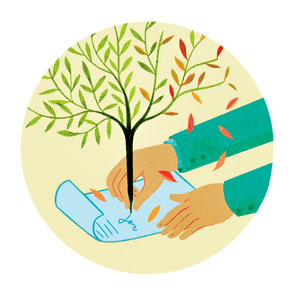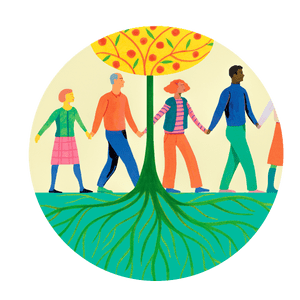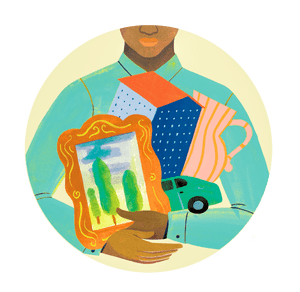The next gift you give to Carleton could help ensure a strong education for generations to come.
The youngest member of the Joseph Lee Heywood Society hasn’t even graduated yet — he’s in the Class of 2023 — but he’s already planning for the future. The society, more than 2,400 strong, includes alumni, faculty and staff members, and others who have pledged to safeguard Carleton by including the college in their estates. Members don’t need to reach a threshold age or dollar amount. They simply share a commitment to making sure a Carleton education means the same for future Carls that it does today.

“Establishing a planned gift for Carleton is a tangible and meaningful way to express your deepest values and ensure they continue to shape future generations. You are creating opportunities for students and faculty beyond your own lifetime,” says Lynne Wilmot ’89, P ’23, director of planned giving. Donors are welcomed into the Heywood Society anonymously if they prefer, although Wilmot (a member herself) says the college appreciates hearing from every donor. “We want to make sure we understand what inspired this gift and what the intentions are for those funds. We also like to thank people.”
Adam Stock ’95, a financial planner and partner with the Next Level Planning Group in Chicago, regularly guides his clients through the various ways to structure philanthropy. And he says Carls considering a gift should keep in mind that it’s not all about the numbers; giving is an emotional and philosophical exercise through which donors of any age can review their life and its most meaningful influences. “Giving is so personal and, for many alumni, it’s wrapped up in their story,” Stock says. “My Carleton story is unique to me and it’s very deeply rooted.”
Donate Appreciated Stock

Stock and mutual funds owned outside of a retirement account are subject to capital gains tax when they are sold. A donor can avoid those taxes and preserve the full amount of the investment by transferring the investment to a nonprofit and taking a tax deduction for the amount donated. “I think of this as the 101 Strategy,” says Stock. “It’s the first thing that I talk about with philanthropic giving, because it’s simple. There are substantial tax advantages available to those who make charitable gifts, so we evaluate everyone’s specific situation to find the maximum benefit for the donor and the charity.”
Name Carleton as a Beneficiary

Many Heywood Society members have named the college as a beneficiary of a retirement account or life insurance policy. While heirs pay income or estate taxes on distributions, charitable entities do not. Also, individuals over age 70½ are required to take an annual minimum distribution from their retirement accounts. “Instead, they can do what’s called a qualified charitable distribution, which allows the money to go directly from the IRA to the nonprofit and not show up as income on their tax return,” says Stock. “This is a way to avoid having to pay tax on the required minimum distribution. Also, because the standard deduction doubled in 2018, many people aren’t getting a tax benefit by donating. This is a way to have your cake and eat it too.”
Establish Life Income Gifts

When donors need income for living expenses but want to ensure that Carleton receives the balance of their estate, a charitable gift annuity or charitable remainder trust may be a good strategy. The college receives a portfolio to use and invest now, and uses a portion of the donation to provide the donor with an income stream for the rest of their life. A charitable lead trust works the opposite way. It provides the charity with an income stream during a donor’s lifetime, and after the donor passes away the remainder of the gift goes to the donor’s beneficiaries. “Some larger charitable lead trusts might produce enough annual income that they could endow a scholarship or other initiative,” says Stock. “That enables donors to see the money at work today.”
Create Bequests

Carleton has received many unique non-monetary gifts, including real estate, fine art, and other assets. The college typically sells these donations — such as the nice Lexus it recently received — and adds the money to the endowment or directs it to other priorities. Many notable campus structures, including Nourse, Scoville Memorial Library, Severance, and Boliou, are the result of bequests of assets and land.
